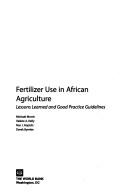| Listing 1 - 3 of 3 |
Sort by
|
Book
Year: 2015 Publisher: Washington, D.C., The World Bank,
Abstract | Keywords | Export | Availability | Bookmark
 Loading...
Loading...Choose an application
- Reference Manager
- EndNote
- RefWorks (Direct export to RefWorks)
Inorganic fertilizer use across Sub-Saharan Africa is generally considered to be low. Yet, this belief is predicated on the assumption that it is profitable to use rates higher than currently observed. However, there is little rigorous empirical evidence to support this notion. Using a nationally representative panel data set, and with due recognition of the role of risk and uncertainty, this paper empirically estimates the profitability of fertilizer use for maize production in Nigeria. The analysis finds that inorganic fertilizer use in Nigeria is not as low as conventional wisdom suggests. Low marginal physical product and high transportation costs significantly reduce the profitability of fertilizer use. The paper finds evidence that strategies to reduce transportation costs are likely to have a much larger effect on the profitability of fertilizer use than fertilizer subsidies. Apart from reduced transportation costs, other constraints such as timely access to the product; availability of complementary inputs such as improved seeds, irrigation, and credit; as well as good management practices are also necessary for sustained agricultural productivity improvements.

ISBN: 082136880X 0821368818 9780821368800 9780821368817 9786610765812 128076581X Year: 2007 Publisher: Washington, DC : World Bank,
Abstract | Keywords | Export | Availability | Bookmark
 Loading...
Loading...Choose an application
- Reference Manager
- EndNote
- RefWorks (Direct export to RefWorks)
Fertilizer use in Africa as compared to other developing regions has been limited. What types of policies and programs are needed to realize the potential benefits of fertilizer in African agriculture? This book summarizes key lessons learned from past efforts to promote fertilizer in Africa, provides an overview of the current state of knowledge concerning technical aspects of fertilizer use in Africa, and presents good practice guidelines for promoting sustainable increases in fertilizer use.
Third World: agricultural and food problems --- Fertilizer industry --- Fertilizers --- Agriculture and state --- Agricultural chemicals industry --- Artificial fertilizers --- Chemical fertilizers --- Crops --- Fertilisers --- Fertilization of soils --- Fertilizers and manures --- Field crops --- Soils --- Agricultural chemicals --- Plants --- Soil amendments --- Soil fertility --- Fertilization --- Nutrition
Book
Year: 2010 Publisher: Washington, D.C., The World Bank,
Abstract | Keywords | Export | Availability | Bookmark
 Loading...
Loading...Choose an application
- Reference Manager
- EndNote
- RefWorks (Direct export to RefWorks)
While the economic returns to using chemical fertilizer in Africa can be large, application rates are low. This study explores whether this is due to missing and imperfect markets. Results based on a panel survey of Ethiopian farmers suggest that while fertilizer markets are not altogether missing in rural Ethiopia, high transport costs, unfavorable climate, price risk, and illiteracy present formidable hurdles to farmer participation. Moreover, the combination of factors that promote or impede effective fertilizer markets differs among locations, making it difficult to find a single production technology that is uniformly profitable - perhaps explaining the inconsistency between field studies finding large returns to fertilizer use in Ethiopia and survey-based studies finding fertilizer use to be uneconomic. The results suggest that households with greater stores of wealth, human capital and authority can overcome these hurdles. The finding offers some encouragement, but also implies a self-enforcing link between low agricultural productivity and poverty, since low-asset households are less able to overcome these problems. The study suggests that the provision of extension services can be effective and that lowering transport costs can raise the intensity of fertilizer use by lowering the cost of fertilizer and boosting the farmgate value of output.
Access to Finance --- Agricultural output --- Agricultural practices --- Agricultural productivity --- Agricultural techniques --- Agriculture --- Cereal crops --- Chemical fertilizer --- Chemical fertilizers --- Climate --- Climate Change and Agriculture --- Climates --- Crop --- Crop area --- Cropland --- Crops --- Crops & Crop Management Systems --- Farmers --- Farming --- Farming households --- Fertilizer --- Fertilizer use --- Fertilizers --- Fertilizers & Agricultural Chemicals Industry --- Finance and Financial Sector Development --- Industry
| Listing 1 - 3 of 3 |
Sort by
|

 Search
Search Feedback
Feedback About UniCat
About UniCat  Help
Help News
News